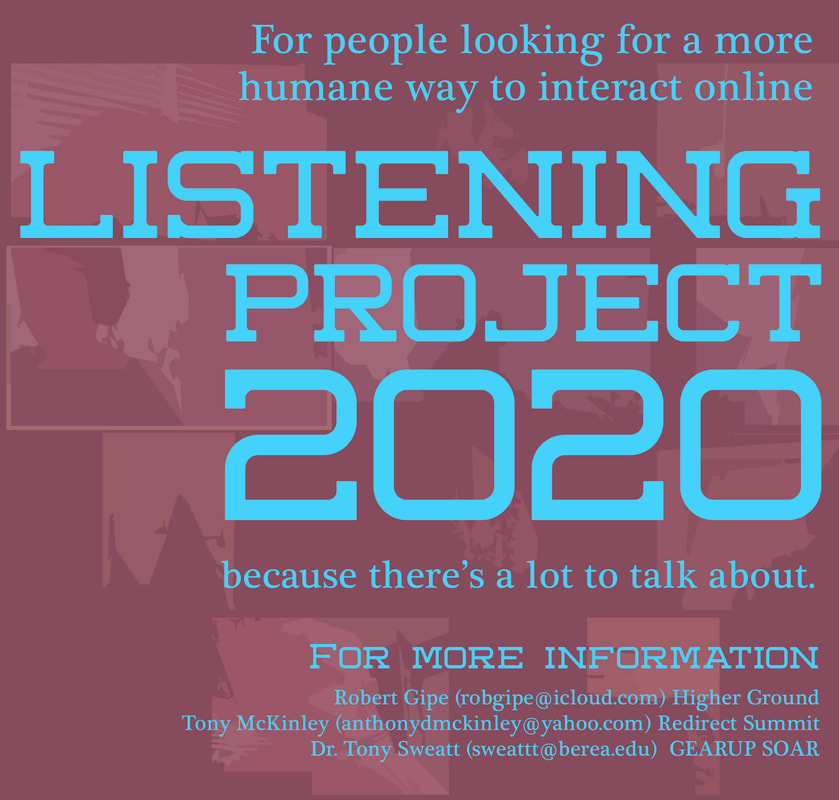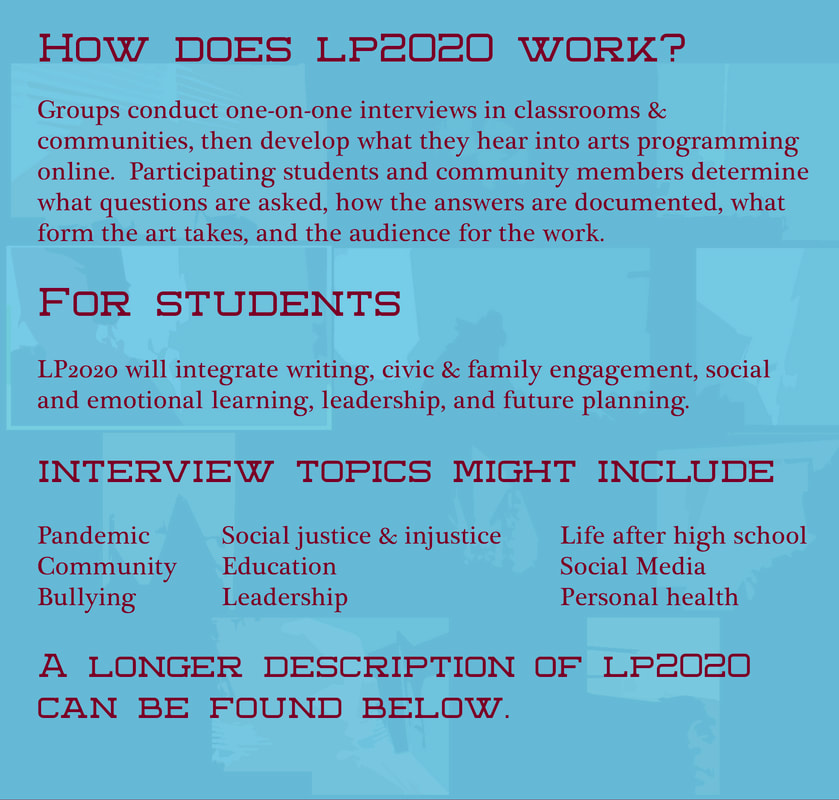Background. Early in the summer of 2020, Dr. Tony Sweatt of GEARUP East Kentucky; Anthony McKinley of Redirect Summit in Charlotte; and Robert Gipe of the Harlan County, Kentucky community arts organization Higher Ground began talking about how to engage youth and communities in productive conversations about the issues of the day in ways that benefit both the communities and individuals. Sweatt and Gipe were part of a listening project in 2003 -2005 that helped our community discuss and respond to the opioid crisis in Appalachian Kentucky. That listening project involved over 200 people in one-on-one interviews and led to a very successful original theater production featuring 80 community members as cast; a photography project that involved over 600 area people as writers and photographers; and public discussion, community development projects, and artmaking that continue to this day. We are now looking for partners to adapt this work to the pandemic and the challenges that face us now.
How Listening Project 2020 might work. We are looking for pilot groups interested in conducting one-on-one interviews in their communities, sharing what they hear with each other and participants in other communities, and then working together across community lines to develop what they hear into programming that can be shared more broadly. We want participating youth and community members to be part of designing all steps of the project: What questions are asked, how the answers are documented, and what form the resulting programming takes.
We are imagining cohorts in multiple locations meeting over Zoom or similar technology to establish a basic working method and goals and then continuing the work in their own communities. These groups would discuss in one-on-one and then small group settings a set group of topics. Together we would document what people say and reflect on what has been said, and together design public programming. That culminating programming will take the form that the participants want it to take. It might be an online talent show, poetry slam, or dramatic production. It might be original music, or public art, or podcasts, or public service announcements. It might be an exhibit on Instagram or a series of Tik Tok videos. It will be what the participants want it to be. Our only hope is that it grows out of our shared discussion and be affirming (even when/if it challenges the status quo), celebratory, inclusive, and based in love for all our fellow humans.
Listening Project in the school setting. Dr. Sweatt has been in discussions with his colleagues at GEARUP about how to integrate writing, civic engagement, family engagement, leadership, and future planning into student work on Listening Project 2020. One scenario for maximizing student gain might go like this: An experienced listener uses the Listening Project interview to talk with a single student. The listener takes notes on what the student says. At the end of the interview, the listener gives the notes back to the student, and the student uses those notes as the brainstorm draft of a personal statement. The student then creates a piece of writing based on what they’ve said in their interview. Moving from being interviewed to writing a personal statement based on that interview is the student’s first project. The student’s second project would be to interview someone in their family or community. This time, the student is taking notes, and creates a second piece of writing based on what they’ve heard from someone else. Teachers or other group leaders can then have students repeat the process with other interviewees or adapt the process how they see fit. Project organizers would only ask that participants capture what is said in interviews and bring that back to the large group as we figure out together what kind of culminating event to do.
Listening Project 2020 interview topics. So far we have identified the following list of potential interview topics and questions within those topics:
- Getting started. Interviewer tells a little about themselves, why we are doing interviews, what’s going to happen with interviews, etc. Then asks some basic introductory questions of interviewee.
- Checking in with the interviewee. How are you doing? What’s going on in your world? How have the past six months been for you? How do you feel? What do you need?
- Community.How are things going in your community? What do you see when you look around your neighborhood?
- Pandemic. How has COVID 19 affected your life? Do you know anyone that has COVID-19 and if so, how are they? How has society’s response to the pandemic affected you? What are your thoughts and feelings about the pandemic? How’s it affecting your life? What’s it been like for so much to be shut down around you? How has it affected your coming and going? Your relations with your friends?
- Social Justice & Injustice.What are your thoughts about the protests for racial justice that have been going on? What are your thoughts about calls for change with law enforcement? What are your thoughts about Blacks Lives Matter? What is working in our society? What needs changing? What changes would you like to see?
- Education.How is school going for you? What do you like about it? What don’t you like about it? What could make school a better experience for you?
- Life after school. What are you thinking about doing when you get done with high school? What will it take for you to be happy and successful in life? What kind of support do you need?
- Social media. Do you use social media? If you do, why? If you don’t, why not? If you do, which social media do you use and how do you use them? What do you like about social media? What don’t you like?
- Bullying.What are your thoughts and experiences with bullying? What should be done about bullying?
- Leadership.If you were in leadership of your community, or state, or country, or the world, what would you do? What would be different? Why would you do the things you’d do as leader?
- Open response. What else is on your mind? What else would you like for us to know? What else would you like to say to the world, to other young people, to the people who have control of your life?
As was mentioned earlier, participants would be part of defining the final interview structure.

